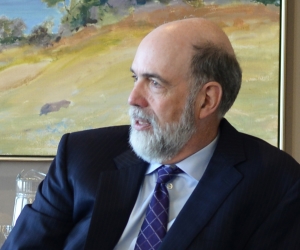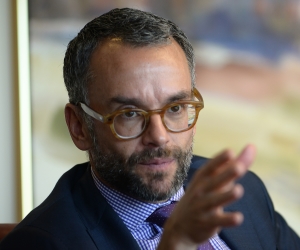Editor's note: For investors in Canadian equities, 2016 has so far been a year of recovery. In today's part 1 of our coverage of Morningstar's Canadian equity roundtable, three portfolio managers discuss what's been driving the market rebound, and the extent to which it may be sustainable. Gold stocks, for example, look vulnerable.
Our panellists:
Mark Thomson, chairman of the board and managing director, equities at Beutel, Goodman & Co. Ltd. Thomson and his team are responsible for a range of mandates including Beutel Goodman Canadian Equity, Beutel Goodman Canadian Dividend and Beutel Goodman Balanced.
Michael O'Brien, managing director and head of the core Canadian equity team at TD Asset Management Inc. His mandates include that of lead manager of TD Canadian Equity and TD Balanced Income.
Daniel Bubis, president and CEO of Winnipeg-based Tetrem Capital Management Ltd. Bubis and his team manage a range of mutual funds for CI Investments Inc., including CI Canadian Investment and CI Canadian Investment Corporate Class.
The roundtable was convened and moderated by Morningstar columnist Sonita Horvitch. Her three-part series continues on Wednesday and Friday.
Q: What a difference a year makes. In 2015, the S&P/TSX Composite Index was one of the worst performing indexes in the world, with a negative total return of 8.3% for all of 2015 and a negative total return of 8.4% for the 12 months to September 2015.
In the 12 months to the end of September 2016, its total return at 14.2% is on a par with that of the S&P 500 Index and the MSCI World Index over the same period. (Using U.S.-dollar returns for the latter two indexes.) What changed for the better?
 |
|
 |
|
| Mark Thomson | |
 |
|
 |
|
 |
Thomson: There are a number of names that did well in 2016, although we would not be interested in them because the companies do not earn their cost of capital or generate excess free cash flow. Take the gold stocks, for example. Investors had such a dislike of them in 2015 that there did not need to be much of a change in the fundamentals, in this case an increase in the gold price in 2016, for the stocks to react positively and very strongly. The same rationale goes for the Canadian equity market. The market was out of favour in 2015.
In a world with excess liquidity with investors looking for opportunity, there was a return to the Canadian equity market in 2016. It must be remembered that high liquidity on a global basis is good for economies and good for financial markets from a sustainability perspective.
Bubis: Mark is right. We are potentially looking at a multi-year bull market in equities. Getting past the U.S. presidential election, which has caused some uncertainty, will help to keep this bull market going.
O'Brien: In our roundtable at the same time last year, we noted that there was negative sentiment about the Canadian equity market from a top-down perspective, but that we, as bottom-up managers, were seeing opportunities.
Bubis: The statistics on international money flows into Canada indicate how negative this has been for years. But if you look at this data for 2016, it probably turned positive in late January, early February, about the same time that the Canadian equity market was at a low. At that time, you started to see global investors becoming more interested in Canada.
O'Brien: A key turning point was that the oil price stopped falling.
 |
|
 |
|
| Daniel Bubis | |
 |
|
 |
|
 |
Bubis: This was not only important for Canada, but for equity markets globally. There was this view that lower oil prices would benefit the consumer, but, in this case investors were using the lower oil price as a barometer for future economic growth. Until the oil price stabilized, there were concerns about the safety of equities and a potential deflationary explosion.
While the international investor has become more bullish on Canada, the domestic investor is still somewhat negative. In aggregate, domestic flows into Canadian equities have been negative and international flows have been positive. The domestic flows out of Canadian equities have been particularly noticeable in the mutual-fund industry.
O'Brien: Money is coming out of the Canadian equity mutual funds and going elsewhere.
Thomson: Some of it is going into Canadian indexed equity funds.
O'Brien: Domestic money is also going into fixed-income funds.
Thomson: Fixed income has done well, as rates have continued to go down.
O'Brien: An interesting development in 2016 is the flow of money into emerging equity and fixed-income markets. It's a good thing for the Canadian equity market, because in global investors' minds there are similarities. Last fall, investors were concerned about emerging markets. They've been stable in the last little while. Maybe there is more of a solid underpinning in this important segment of the global economy.
Bubis: Macro flows of money dominate the financial markets. The Canadian equity market is a small piece of the global equity index. All of a sudden global investors this year realized that oil had bottomed and that the Canadian equity market was cheap. They then bought leading Canadian stocks, and this impacts the Canadian equity market. Foreigners tend to be more renters of Canadian stocks than investors.
Q: Many of the sectors in the Canadian equity market that did badly in the prior 12 months to the end of September 2015 have shone in the latest 12 months to September end. Materials had a total return of 56.2% in the 12 months to the end of September 2016 (versus a negative total return of 29.3% in the prior 12 months). Meanwhile, energy had a total return in the latest 12 months to September end of plus 24.6% versus a negative 34% in the prior 12 months.
O'Brien: Energy and materials have significantly outperformed the market in the 12 months to September 2016. Besides health care, which did poorly during this period, almost all the other sectors did well. There was broad strength in the market.
Bubis: We're value managers, and at this stage it's hard to find high-quality stocks in the Canadian equity market that are cheap. This is certainly the case among the big-cap Canadian oil producers. Some commentators are saying that the big-cap Canadian equity market is trading at fair value. I think that this is a kind way of saying it's expensive. However, I don't want to single out the Canadian equity market in this regard. It's hard to find financial assets anywhere in the world that are cheap.
Thomson: We're also value managers, and there aren't a lot of new names in our Canadian big-cap equity portfolio.
 |
|
 |
|
| Michael O'Brien | |
 |
|
 |
|
 |
O'Brien: I'm more of a growth-at-a-reasonable price manager. You have to be highly selective, but you can find opportunities in the Canadian equity market. It's important to bring down your total-return expectations from the equity market. This is a lower-return world.
Q: Coming back to the Canadian resource sector, energy was 20.7% of the benchmark at the end of September, while materials were 13.1%, for a total of 33.8%. The big question is will these two heavily weighted sectors continue to outperform in the next 12 months to September 2017?
Bubis: The weakness in these two sectors got overdone last year and they set themselves up for a rebound. The question is which moves up are more sustainable and which are not?
O'Brien: A company-specific example of this assessment is the mining company ![]() Teck Resources Ltd. (TCK.B), which was so out of favour at the beginning of 2016 and yet has been one of the best performers so far this year. The key to assessing stocks in these two sectors is to distinguish between those companies that deserved to be out of favour, and consequently the stocks were down and out for fundamental reasons, and those companies with solid fundamentals. From our extensive research of Teck Resources, we were satisfied that the company had sufficient liquidity to complete its Fort Hills Oil Sands Project and it was not in danger of going bankrupt. Some of the companies in the energy sector did go bankrupt. You have to do your homework.
Teck Resources Ltd. (TCK.B), which was so out of favour at the beginning of 2016 and yet has been one of the best performers so far this year. The key to assessing stocks in these two sectors is to distinguish between those companies that deserved to be out of favour, and consequently the stocks were down and out for fundamental reasons, and those companies with solid fundamentals. From our extensive research of Teck Resources, we were satisfied that the company had sufficient liquidity to complete its Fort Hills Oil Sands Project and it was not in danger of going bankrupt. Some of the companies in the energy sector did go bankrupt. You have to do your homework.
Thomson: Gold stocks did well this year. The question is whether this business is one that will build value over time. I think not. There are huge expectations built into the current stock prices.
Bubis: Yes, the gold stocks are expensive. These companies still face production declines, even accelerating in some cases. Some have fixed up their balance sheets, but they still face long-term challenges, including dealing with the environmental risks.
O'Brien: A diplomatic way to say this is that we would not expect the same level of high returns from gold stocks next year. It was more of a tactical opportunity this year.
















